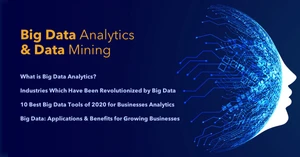What are Big Data Tools?
Big data is a large volume of structured, semi-structured & unstructured data stored by organizations for business information, predictive modeling, machine learning software, and many other applications. Big data tools are used for extracting information from multiple complex data sets and types, and then these tools process this information into meaningful insights about business outcomes, inefficiencies, bottlenecks, customer preferences, and more. Traditional databases are unable to handle large data sets, therefore, businesses use the best and most reliable data tools to manage data in a seamless manner.
Who uses Big Data Tools?
There are a wide variety of businesses and organizations that use big data tools to collect or generate complex and large data sets. Here is a list of industries that employ big data tools for various purposes.
- Healthcare: These tools are utilized in the healthcare sector to handle and analyze vast volumes of patient data like medical records, genomic data, and clinical trials, optimize treatment plans and enhance patient outcomes.
- Finance: Big data software systems are used by financial organizations to examine large volumes of data that include market trends, customer behavior, and market movements to detect fraud, improve financial performance and lower risks.
- Manufacturing: The manufacturing sector uses big data tools to optimize production processes, improve quality control, and decrease downtime. Moreover, these tools help in sensor data analysis for machines and equipment.
- Retail: These tools are used in the retail industry for analyzing customer data like customer preferences, behavior, and purchase history. This further helps to optimize sales & marketing campaigns, improve customer experience and inventory management process.
- Transportation: Transportation companies utilize big data tools for analyzing data from GPS, sensors and many other sources. This helps to improve safety, decrease fuel consumption and optimize routes.
Why use Big Data Tools?
There are numerous reasons like enhanced operational efficiency, scalability and cost-effectiveness for using big data tools. Let’s look at these factors in more detail.
- Scalability: Big data tool systems are specifically designed to manage complex data sets that are difficult to process in traditional database systems. By using these tools, your company can scale its data processing as well as analysis abilities as the data increases.
- Cost saving: Numerous big data tools such as Apache, Spark, Hadoop and others can help by reducing storage costs of data management and warehouse systems by storing enormous amounts of data. Therefore, providing more effective and better methods of managing big data.
- Enhance operational efficiency: By using big data tools, you can optimize your operations by finding out the areas of improvement and inefficiencies. These tools empower you to analyze data from multiple sources and get valuable insights about your processes, customer interactions and supply chains. It lets you improve overall efficiency and make changes accordingly.
Key Features of Big Data Analytics Tools
Smarter data quality, swift data processing, link analysis, and enhanced security are some handful of the noteworthy features of big data tools. Let’s dive in and shed some light on the unique features big data tools.
- Connectors: Connectors are modules or components that help in the integration of numerous systems and data sources with the big data platform. Some big data tools offer multiple connectors under a single roof, which allows seamless extraction and processing of large volumes of data from multiple sources into a data system.
- Hadoop cluster: You can run applications in Hadoop Cluster, up to ten times quicker on disk and 100 times quicker in memory.
- Smarter data quality: Some cutting-edge big data tools offer smarter data quality with natural language processing and machine learning facility.
- Faster data processing: The top-grade big data tools come with an in-memory data processing facility, which is much faster than the disk processing process.
- Extended security: Ensure the utmost security and governance of data assets while extending on-premises controls on the cloud.
- Graphical facilities: These tools offer graphical capabilities for data analysis that can be displayed on screen or in the form of hardcopy.
- Link analysis: In big data tools you get a link analysis facility between graph items, geospatial analysis, mapping systems integration, multimedia analysis, and a set of projects that allow real-time collaboration.
Benefits of Big Data Tools
The usage of big data tools provides numerous benefits like customer retention, targeted promotions, real-time insights, and so on. Here we look at some key benefits these tools have to offer.
- Data Processing: One of the most critical attributes of big data tools is data processing. These tools collect raw data and organize it to get inferences. Thanks to data modeling, you can take complex sets and display them in the form of visual charts or diagrams. This process makes the data easy to interpret and digestible for users so that they can take informed decisions.
- Customer acquisition & retention: With the help of the digital footprints of your customers, you can learn about their needs, purchase behavior, preferences, etc. You can use big data tools to observe customer patterns and modify your products & services as per their specific requirements. It helps in ensuring customer satisfaction, trustworthiness, and a boost in sales.
- Focused & targeted promotions: Big data tools let you deliver customized items to your target audience thus you don't have to spend a large amount on promotional campaigns that do not provide the desired results. With the help of these tools, you can analyze consumer trends by analyzing point of sale and online shopping transactions. These insights help you to design targeted and focused campaigns that can help you in living up to your customer's expectations and create a long-term relationship with them.
- Risk Identification: Your business functions in a high-risk environment, hence you need a reliable risk management tool to handle this issue. Big data tools play a critical role in creating highly effective strategies and procedures for risk management. With the help of these tools, you'll quickly address and reduce all the issues by optimizing difficult decisions for potential threats and unexpected events.
- Innovation: Insights you'll get by using big data tools will allow you to update your current products or services. The big chunk of collected data will help you in identifying the best-suited items for your customer base. Information about what they think about your product will assist in product development, and the data can also be used to improve marketing strategies, business strategies and improve customer service. Moreover, big data tools also promote real-time tracking of the domain and keep you ahead of your competitors.
- Latest Big Data Tools Trends: Nowadays, following big data trends has become critical for business as they help in stay ahead of the competition, plus implementing these trends result in increased efficiency and better decision-making. In the next few paragraphs, we'll go over some of the key trends in this domain..
- Quantum computing: Nowadays, technology takes a significant amount of time to process bulk data, whereas, in quantum computers, you can estimate the likelihood of an object's condition or an occurrence even before it is calculated. It means that quantum computers can easily process more data than standard computers and at a lightning-fast speed. This gives the organization the ability to make timely decisions and attain more desired outcomes.
- Predictive analysis: The usage of predictive analysis is increasing every day and it is considered as a key asset for numerous organizations. They look at the data and use predictive analysis to understand how consumers will react to a particular product, event or service, plus it also predicts future market trends. This analysis is used in numerous domains for tasks like identifying credit card fraud and predicting the customers who can default on their loans.
- Data Lakes: The way businesses store and analyze their data is changing because of the new form of architecture known as data lakes. In the past, companies used relational databases to store their data, but the problem with this kind of storage is highly structured which makes it impossible to store different types of data like video files, audio files, photos, and more. Moreover, data lakes allow companies to keep all their data in one single place.
- Data Fabric: A data fabric is a group of data services and frameworks utilized in hybrid multi-cloud systems that provide consistent functionality and best big data set practices. Data fabric offers the facility to share data on multiple applications and platforms without the requirement of additional software or third-party tools. Organizations can use it as a reliable substitute for Hadoop clusters or as an additional tool for storing large amounts of unstructured data.
Factors to Consider When Buying Big Data Tools
When buying big data tools, there are numerous factors you need to consider for selecting a perfect tool that meets your company's requirements. Some of those key factors are.
-
Identify your goals
You should start by trying to work back on the actual problems you are trying to resolve as the starting point of the buying process.
Do you need a reliable visualization tool? Do you want to upgrade from Microsoft Excel? Are you looking for a solution to analyze terabytes or gigabytes of data? Are you looking to decrease the waiting time for your query returns? Is your data unstructured or structured? Do you want to empower your employees to analyze data and create reports?
When you know the answers to all the questions, you'll be easily able to choose appropriate big data tools.
-
Scalability
Big data repositories are getting bigger every day. You not only require big data tools that perform quickly now, but need tools that can continuously give desired results even as the data grows exponentially.
Owing to the need for scalability, cloud-based big data tools have gained immense popularity among businesses.
-
Security
The massive data in the big data stores includes a lot of sensitive information that can be highly valuable for competitors, hackers and states-nations. You need to make sure that all the data has appropriate protection to avoid all types of data breaches that have been dominating the headlines.
It means that you should always look for tools that have cutting-edge security features such as encryption, multifactor authentication, regular updates, data backup facility and more.
-
Cost of Ownership
The upfront expenses of big data tools only represent a small portion of the overall picture. You must also consider the hardware costs, subscription fees, support charges, ongoing license, employee time and expenses related to an on-premise application. Moreover, don't forget that the expenses of cloud computing normally decrease over time.



















